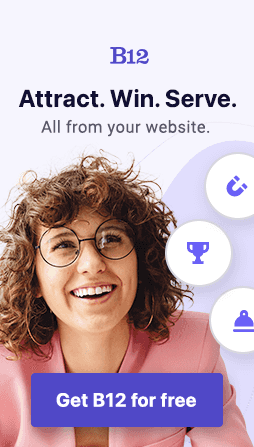Launch an online presence that makes it simple to attract, win, and serve clients
B12 uses AI and experts to quickly set up your website, scheduling, payments, email marketing, and more.
Get started for free
Steps to develop a digital content strategy

Content is king. That means businesses must have a coherent content strategy to stay ahead of the competition, particularly in improving search engine optimization and making a strong first impression on your audience. But what exactly is content strategy, and why is it important in digital marketing?
In this blog post, we'll delve into the key steps involved in developing an effective content strategy. We've compiled a comprehensive guide that covers everything from setting goals to creating a content plan, developing engaging content, and refining your strategy over time.
The basics of content strategy
Content strategy is the process of planning, developing, and executing a strategic approach to creating and distributing valuable, relevant, and consistent content. It involves setting goals for your content, understanding your target audience, creating a content plan, and executing that plan through effective content creation and distribution channels.
A robust content strategy lays the foundation for successful content marketing, which is critical to generating website traffic, building brand awareness, and driving revenue growth.
Why content strategy is important in digital marketing
Digital marketing is all about reaching and engaging your target audience online. With more and more businesses competing for attention in the digital space, it's essential to have an effective content strategy that cuts through the noise and resonates with your audience. A solid content strategy helps to establish your brand as a thought leader and authority in your industry, build trust and credibility with your audience, and create a compelling narrative that connects your business to your customers.
Content strategy also plays a crucial role in search engine optimization. By creating high-quality, valuable content that is optimized for relevant keywords, you can improve your website's search engine rankings and attract more organic traffic to your site. Content strategy is also closely tied to social media marketing, as social channels are a key distribution method for your content. By creating a well-planned content strategy, you can achieve greater reach and engagement on social media platforms.
Businesses can't afford to have a haphazard approach to content marketing and expect to succeed. Without a cohesive content strategy, businesses risk losing their target audience's attention and failing to distinguish themselves in the marketplace. By following the steps outlined in this guide, you'll be well on your way to creating a successful content strategy that will help you achieve your business goals and stay ahead of the competition.
Setting goals for your content marketing strategy
When it comes to developing a successful digital content strategy, it is essential to set goals that align with your business objectives. Before deciding on the type of content to create or the channels to use, it is necessary to determine what you want to achieve through your content. Some common content marketing goals include generating leads, building brand awareness, increasing engagement, and driving conversions.
Importance of aligning content goals with business objectives
Creating a content marketing plan that aligns with your business objectives ensures that your efforts are not in vain. Aligning your content goals with your business objectives can help you track progress and measure success. Setting goals that are specific, measurable, achievable, relevant, and time-bound (SMART) is an effective way to ensure that your content strategy is aligned with your business goals.
Understanding your target audience
To create content that resonates with your target audience, it is essential to understand who they are, what they are looking for, and what motivates them to engage with your brand. Building user personas and conducting audience research are valuable approaches to understanding your target audience. User personas are fictional representations of your ideal customer, while audience research involves collecting data on your audience's demographics, preferences, behaviors, and pain points.
Defining your target audience
Defining your target audience is crucial when creating a content marketing plan. Knowing who you are targeting enables you to create content that speaks directly to your audience's needs, interests, and challenges. Understanding your audience's demographics, such as age, gender, and location, can help you tailor your content to suit their interests. Furthermore, defining your target audience can help you choose the most effective channels and formats for your content.
Building user personas
To understand your audience better, you need to create user personas. A user persona is a fictional representation of your ideal customer. It includes demographic information, interests, needs, and pain points. By creating user personas, you can identify the unique characteristics of your audience and tailor your content to them.
Conducting audience research
Once you have your user personas, you need to conduct thorough audience research. There are several ways to conduct audience research, such as surveys, interviews, and social media listening. You can use this research to gather insights into your audience's behaviors, preferences, and needs. This information can help you create content that resonates with your audience and drives engagement.
Understanding the buyer's journey
In addition to understanding your audience's characteristics, it's important to understand their buyer's journey. The buyer's journey is the process that a potential customer goes through before making a purchasing decision. It includes the stages of awareness, consideration, and decision. By understanding where your audience is in the buyer's journey, you can create content that addresses their specific needs and moves them along the funnel.
Creating a content plan
Once you've defined your target audience and set your content marketing goals, the next step is to create a content plan. A content plan outlines the topics and types of content you will create to meet your audience's needs and achieve your marketing objectives.
How to create a content plan
To design an effective content plan, you need to balance your audience research with your business goals. When brainstorming content ideas, ask yourself questions like: What problems does my audience face? What content formats will resonate with them? How can I align my content topics with my business objectives?
Creating content calendar
A content calendar helps you organize which pieces of content to create and when to publish them. Your editorial calendar should include the title, format, due date, and publishing date of each piece of content.
Break down your content creation process into manageable tasks by assigning team members responsible for creating, editing, and publishing content. This division of labor will help you to meet your publishing deadlines.
Types of content to consider
When developing a content plan, consider creating a variety of content types to appeal to different users. Some of the content types to consider are blog posts, social media posts, infographics, videos, case studies, and eBooks. Creating a mix of content formats enables you to cater to different user preferences and learning styles.
Remember to align your content formats with your audience's preferences and your marketing goals. Your content plan should aim to educate, inform, and entertain your audience while driving conversions and loyalty.
Content creation and execution
Creating effective content is vital to the success of any content strategy. Here are some tips to help you create content that resonates with your target audience and achieves your content marketing goals.
Tips for creating effective content
The key to creating effective content is to focus on the needs and interests of your target audience. Some tips to help you do this include choosing topics that are relevant to your target audience, using a conversational tone to connect with readers, and incorporating visuals to make your content more engaging.
Importance of quality content creation
The quality of your content matters just as much as the quantity. Creating high-quality content that is informative, useful, and engaging can help you establish credibility with your target audience and build trust with your customers. Quality content can also help you improve your search engine rankings, increase your website traffic, and generate leads for your business.
Measuring and analyzing content performance
Measuring and analyzing the performance of your content is essential to refining and improving your content strategy. You can use various metrics to track the performance of your content, such as website traffic, social media engagement, and lead generation. By analyzing this data, you can identify which types of content are resonating with your audience and adjust your strategy accordingly.
Importance of continuous improvement
To ensure the success of your content strategy, it's essential to continuously review and refine your strategy. By regularly evaluating your content performance, tracking changes in your target audience, and adjusting your strategy as needed, you can ensure that your content continues to drive action and achieve your content marketing goals.
Continuous improvement of content strategy
A successful content strategy is not a set-it-and-forget-it approach. Rather, it requires continuous refinement to remain effective. Continuous improvement involves reviewing and evaluating your content strategy and making adjustments as needed.
How to refine your content strategy
To refine your content strategy, first, evaluate the results of your current strategy. Determine what is working and what isn't. Use metrics like engagement rates, bounce rates, and time spent on-page to understand how people are interacting with your content. Based on these insights, you can refine your content strategy to better align with your goals and audience.
Continuously reviewing and evaluating your strategy
Continuous improvement of content strategy requires constant monitoring and evaluation. Regularly review the performance of your content against your goals. This will help you understand what content is performing well, what's not resonating with your audience, and what types of different content you may want to test out. Make sure that you're constantly asking yourself: does this content align with my goals? Is it resonating with my audience? Is there an opportunity to optimize?
Importance of adjusting your strategy as needed
Content strategy is not a one-size-fits-all solution, and what worked in the past may not work in the future. That's why it's essential to adjust your strategy as needed to remain effective. This may entail tweaking your content calendar, trying out different types of content, or shifting your focus. It's important to be flexible and open to change and to adjust your strategy based on your results.
Enhance your digital content strategy with B12
Boost your digital content efforts with the help of B12. As part of our solution, we offer an AI-powered text generator that can enhance your content efforts. We also have a team of expert copywriters who can provide you with engaging content.
Your content needs to live on a professional website that ensures you look credible. B12 is that solution, integrating your content, client intake, scheduling, payments, contact management, and more. Attract leads, win business, and serve clients online with B12. Get started for free today.
Attract, win, and serve more clients
Receive helpful resources directly to your inbox to help you succeed online.
Spend less time on your website and more time growing your business
Let B12 set up your professional online presence with everything you need to attract, win, and serve clients.




